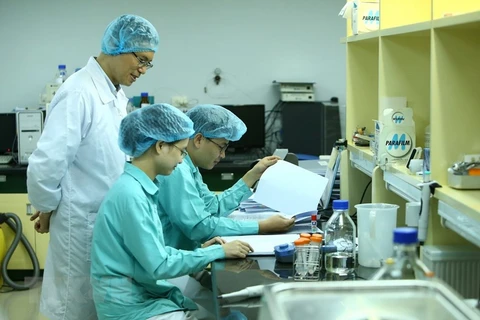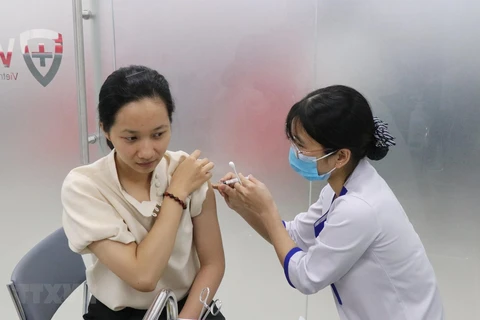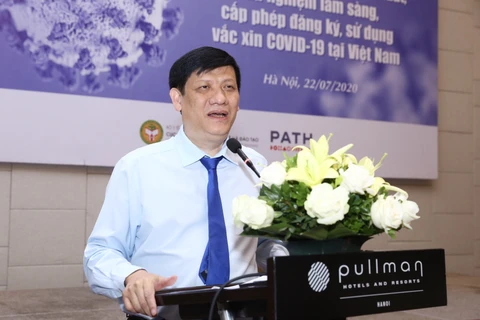 Studying protein volume in vaccines at a lab of the Company for Vaccine and Biological Production No.1 (Vabiotech) (Photo: VNA)
Studying protein volume in vaccines at a lab of the Company for Vaccine and Biological Production No.1 (Vabiotech) (Photo: VNA)
Hanoi (VNA) – Vietnam is one of the 42 countries able to produce vaccines and among 38 nations to have a vaccine management agency meeting the World Health Organisation (WHO)’s standards.
As the COVID-19 pandemic develops complicatedly worldwide, the research and production of a COVID-19 vaccine is increasingly important.
At a workshop discussing the clinical production, testing, licensing and use of a COVID-19 vaccine held in Hanoi on July 22, acting Minister of Health Nguyen Thanh Long said Vietnam already has a national vaccine management system (NRA) meeting the WHO’s standards. If successful, the COVID-19 vaccine could be exported to drive back the pandemic worldwide.
However, vaccine production will be difficult without the joint efforts of the Government, State management agencies, vaccine producers, researchers and ethic councils for biomedical studies, donors and technical support units.
Prof. Long said Vietnam is doing well in controlling the pandemic. However, social distancing is only a temporary measure to minimise new infections and prevent its spread. Though there is much more about SARS-CoV-2 that scientists need to learn, the most effective measure to drive it back is a vaccine.
Dr. Vu Huong, Regional Technical Advisor from the Centre for Vaccine Initiatives and Access, said that there were 163 candidate COVID-19 vaccines under study as of July 15, with 23 vaccines undergoing testing on humans and the remaining 140 in the pre-clinical stage, including those made by Vietnam. The whole world is working hard to produce COVID-19 vaccines, with all procedures shortened to ensure quality and progress.
Vietnam is one of the 42 countries to be able to produce vaccines. With the diphtheria epidemic in the Central Highlands and several central provinces, Vietnam could actively produce and meet the demand of localities. Similar to COVID-19, Vietnam also advocated the production to ensure vaccine security. Vietnam is also among 38 nations to have a vaccine management agency meeting the WHO’s standards, thus opening opportunities to expand cooperation and export vaccines to countries.
Long directed producers and research units to continue proactively studying COVID-19 vaccine production while the Health Ministry’s departments and agencies must soon complete regulations on research, production, clinical testing, licensing and the use of a COVID-19 vaccine in Vietnam.
Units in the NRA were also asked to step up the verification of clinical trial research records and licensing, thus creating favourable conditions for the effort in the shortest time while ensuring the principle of safety and effectiveness for users in the fight against the pandemic in the country and the world.
Participants at the event heard reports on COVID-19 developments in the world, the preliminary results of vaccine research plans by four domestic producers, namely Vabiotech, Polyvac, Ivac and Nanogen. Each producer took a different path, but the initial results were positive.
They also extensively talked about draft regulations on production, clinical testing, licensing and the use of a COVID-19 vaccine in Vietnam.
Organised by the Health Ministry with the technical support of PATH organisation and financial support of the UK Embassy in Hanoi, the event offered suitable mechanisms, policies and regulations to ensure the safety and efficiency of vaccines to volunteers as well as vaccine users.
The first phase of human trials on a made-in-Vietnam COVID-19 vaccine could begin as early as this October.
The Institute of Vaccines and Medical Biologicals (IVAC) in Nha Trang city, partnering with New York City-based Icahn School of Medicine and the global health non-profit organisation PATH, expects to conduct testing on small groups of volunteers in October-December this year.
Phase 2, which comprises of larger groups of people, and Phase 3, which has up to a thousand, will be conducted at the beginning of 2021.
The institute plans to submit documents for approval to the health ministry as early as April next year and claims to be capable of producing 30 million doses a year.
By October 2021, the vaccine could be distributed to the general population.
IVAC is researching an egg-based vaccine, making use of the Newcastle disease virus (NDV) expressing the spike protein of SARS-CoV-2.
According to Duong Huu Thai, head of IVAC, the production of its COVID-19 vaccine will be similar to the production of the influenza vaccine./.
























